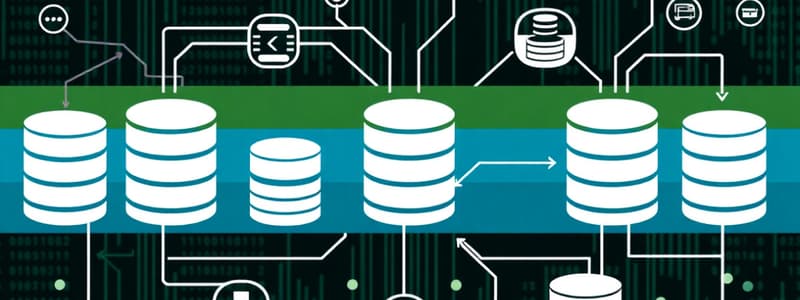Podcast
Questions and Answers
What is a primary function of a database?
What is a primary function of a database?
- To replace the need for data integrity checks
- To store unrelated data in a non-structured manner
- To generate random data for testing purposes
- To efficiently manage and reorganize related data (correct)
What is one of the main disadvantages of using databases?
What is one of the main disadvantages of using databases?
- They require less data integrity oversight
- They eliminate the need for database administration
- They entirely eliminate data redundancy
- They can be expensive and time-consuming to set up (correct)
Which statement correctly describes relational databases?
Which statement correctly describes relational databases?
- They are implemented using a three-dimensional model for data organization
- They store data in formats such as XML or JSON
- They organize data into tables with primary and foreign keys for relationships (correct)
- They primarily store data as objects with methods for manipulation
In the context of databases, what does data integrity refer to?
In the context of databases, what does data integrity refer to?
Which of the following is NOT a step in creating a database table?
Which of the following is NOT a step in creating a database table?
Which type of database allows for data to be analyzed from multiple perspectives?
Which type of database allows for data to be analyzed from multiple perspectives?
What role do database administrators (DBAs) primarily serve?
What role do database administrators (DBAs) primarily serve?
Which of the following characteristics is unique to object-oriented databases compared to relational databases?
Which of the following characteristics is unique to object-oriented databases compared to relational databases?
What is the primary purpose of a database function?
What is the primary purpose of a database function?
Which statement correctly describes a data warehouse?
Which statement correctly describes a data warehouse?
What is a key characteristic of management information systems (MIS)?
What is a key characteristic of management information systems (MIS)?
What is the main function of a transaction-processing system (TPS)?
What is the main function of a transaction-processing system (TPS)?
How does batch processing benefit business operations?
How does batch processing benefit business operations?
Which component is NOT considered integral to a business intelligence information system?
Which component is NOT considered integral to a business intelligence information system?
What is a distinctive feature of office support systems (OSS)?
What is a distinctive feature of office support systems (OSS)?
Which of the following is NOT a function of business intelligence systems?
Which of the following is NOT a function of business intelligence systems?
Flashcards
Database
Database
A collection of related data that can be stored, organized, and accessed.
Data Integrity
Data Integrity
The process of ensuring data is accurate and reliable.
Relational Database
Relational Database
A database management system (DBMS) that organizes data into tables with rows and columns.
Object-Oriented Database
Object-Oriented Database
Signup and view all the flashcards
Multidimensional Database
Multidimensional Database
Signup and view all the flashcards
Data Warehouse
Data Warehouse
Signup and view all the flashcards
Business Intelligence Systems
Business Intelligence Systems
Signup and view all the flashcards
Office Support System (OSS)
Office Support System (OSS)
Signup and view all the flashcards
Batch Processing
Batch Processing
Signup and view all the flashcards
Management Information System (MIS)
Management Information System (MIS)
Signup and view all the flashcards
Real-time Processing
Real-time Processing
Signup and view all the flashcards
Data Mart
Data Mart
Signup and view all the flashcards
Database Functions
Database Functions
Signup and view all the flashcards
Study Notes
Database Building Blocks
- Databases are collections of related data, enabling organized storage, sorting, and querying.
- Databases transform raw data into meaningful information.
- Data is created/generated and stored, enabling data retrieval.
Advantages of Using Databases
- Efficiently manages large amounts of data.
- Facilitates information sharing.
- Promotes data accuracy and reliability through centralization.
Disadvantages of Databases
- Setup and maintenance can be time-consuming and expensive.
- Requires careful management to function correctly.
- Database administrators are responsible for design, construction, and ongoing maintenance.
Database Planning and Creation
- Databases involve defining field names, data types, maximum field sizes, and optional default values.
- Data types should be defined for efficient database operation.
- The process is repeated for each field in the database.
Database Types
- Relational databases are the most common type, organizing data in tables.
- Tables contain related data and are linked using primary and foreign keys.
- Object-oriented databases manage data as objects.
- Multidimensional databases can be analyzed from multiple perspectives.
Database Functions
- Databases can populate and import data.
- They allow users to extract subsets of data.
- They create meaningful outputs.
Data Warehousing and Storage
- Data warehouses are large-scale data collections.
- They organize and store data from various sources.
- Data comes from multiple databases and provides a comprehensive view of operational data.
Business Intelligence Systems
- Software solutions analyze information for decision-making.
- They provide real-time data and insights.
- Systems like DSS help analyze data and develop solutions to business problems.
Office Support Systems (OSS)
- OSS improves communication and assists employees in completing tasks.
Transaction-Processing Systems (TPS/Batch Processing)
- TPS process transactions in batches when appropriate.
- This is suitable for activities that are not time-critical.
Management Information Systems (MIS)
- MIS provide accurate and timely information.
- Managers use it for critical decision-making.
- Reports are available in detail, summary, and exception formats.
Decision Support Systems (DSS)
- DSS help managers solve specific problems.
- Users can incorporate insights and experiences.
Data Mining
- Data mining analyzes large datasets to identify trends and patterns.
Studying That Suits You
Use AI to generate personalized quizzes and flashcards to suit your learning preferences.




